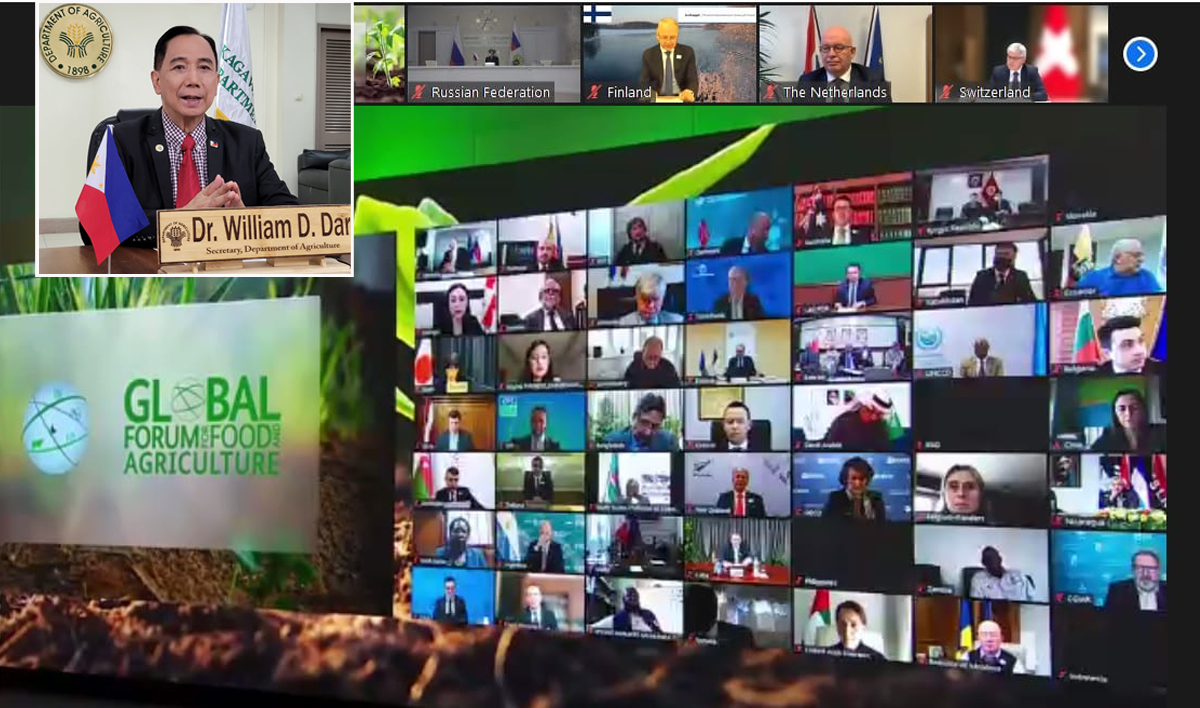
As the global distress caused by the pandemic continues to affect many populations, leaders of the agriculture sector, as well as thousands of agri-fishery industry stakeholders, met to discuss policies to further strengthen cooperation to attain food security, anchored on sustainable land use.
Speaking at the 14th Berlin Agriculture Ministers’ Conference, on January 28, 2022, during the Global Forum for Food and Agriculture (GFFA), Agriculture Secretary William Dar assured his counterparts and heads of delegations that the Philippines shares the common global direction of sustainable resource use for long-term productivity.
In particular, the Philippines’ Department of Agriculture (DA) continues to pursue programs on soil enrichment, conservation, and regeneration — as key response to environmental challenges to food security, and the global pandemic.
“The Philippines is taking a similar path in optimizing the use of limited and dwindling resources for long-term productivity and sustainability,” Secretary Dar said.
These include continuing efforts in soil conservation, regeneration, and enrichment, as the country’s response to environmental challenges and impacts of climate change to attain sustainable food security.
The agri chief also echoed his concerns on the threat of hunger, food security, and nutrition, and hopes that with the GFFA platform, universal and immediate actions will be given utmost importance.
He assured the United Nation’s Food and Agriculture Organization (FAO), Food Systems Summit, of the full support of the Philippines, as the Duterte administration continues to take steps in support of and attain the UN-FAO sustainable development goals or SDGs.
In addition, the DA through the Bureau of Soil and Water Management (BSWM) serves as the national focal for the UN’s Convention to Combat Desertification (UNCCD), and chairs the Asian Soil Partnership under the FAO-Global Soil Partnership (GSP).
“We are one with other UNCCD member-countries in neutralizing land degradation in support of the five pillars of actions under the GSP. We also signed a letter in support of France’s ‘4 per 1000 initiative’ which aims to demonstrate that agricultural soils play a crucial role in food security and climate change efforts,” Secretary Dar said.
Since returning from the International Crops Research Institute for the Semi-Arid Tropics (ICRISAT) in India, where he served as director-general for 15 years, Dar pushed for the management of healthy soils as one of the key ingredients to attain sustainable crop production.
As soil health remains close to his heart, Sec. Dar led the DA through the BSWM and regional field offices in various actions focused on soil rejuvenation.
This includes the National Soil Health Program (NSHP) that aims to rejuvenate “sick soils” that would subsequently lead to increased crop harvests and bigger farmers’ incomes.
The NSHP was patterned after the successful “Bhoochetana” or soil rejuvenation program implemented in 2009 to 2012 by ICRISAT in Karnataka, India, which was instrumental in increasing farmers’ crop yield, ranging from 23 percent (%) to as high as 66%, through the farmers’ adoption of soil-test-based nutrient management recommendations.
“These efforts for healthy and sustainable soil resource are all geared to enabling Filipino farmers to produce and earn more, and subsequently make them, their families, and communities more prosperous,” he concluded. ### (Patrick Lesaca/Adora Rodriguez, DA StratComms/AFID)













